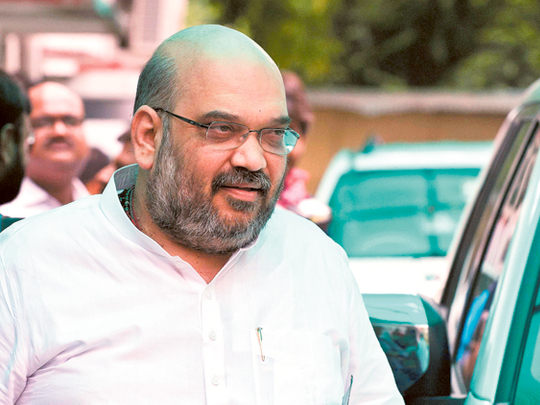
New Delhi: Authorities have lifted a campaigning ban imposed on a key aide to Narendra Modi after he allegedly told Hindu community leaders to seek “revenge” in the country’s elections.
Amit Shah, who has been running the campaign for Modi’s opposition Bharatiya Janata Party (BJP) in the pivotal Uttar Pradesh state, has been in the eye of a public storm after allegedly making the comments in an area where Hindu-Muslim clashes left some 50 people dead in September.
The Election Commission had barred Shah from holding public rallies, meetings and roadshows, but decided late on Thursday to lift the ban after he promised not to “use abusive or derogatory language in the campaign”.
Shah, 50, is a key confidant to hardline Hindu nationalist Modi, the front-runner in mammoth multi-stage elections that are set to vault the BJP to power, ousting the ruling Congress party. Results are due on May 16.
The move came after Shah’s apology to the poll panel.
“I undertake on oath that I shall not use abusive or derogatory language in the campaign and shall not make any utterances violative of MCC (Model Code of Conduct),” Shah said in his apology letter to the commission.
Shah has been dogged by scandals — facing murder and extortion charges, which date back to his time serving under Modi in Gujarat state — and is seen as a potential liability to the party leader, who is running on a platform of clean government.
The aide’s alleged comments had been seen as an attempt to polarise voters on the religious lines for electoral gains, with critics worried that the BJP’s Hindu nationalist rhetoric could stoke religious tensions in a country where 13 per cent of the 1.2-billion population are Muslims.
Shah — one of the most important campaign players for the BJP — has maintained a low profile since the controversy over his alleged remarks, and told the media it was never his intention to violate the electoral code of conduct.
He is not the only politician to have landed in hot water over campaign speeches. The EC has also ordered a probe into statements by Azam Khan, a prominent Muslim leader of the regional Samajwadi Party, which is the ruling party in Uttar Pradesh.
Samajwadi Party (SP) and the Congress on Friday opposed the EC’s decision.
SP accused the EC of working at the behest of the BJP, while the Congress said both Shah and Khan were equally communal. The two leaders were banned by the EC from electioneering at public rallies for their hate speeches, invoking religious sentiments. SP leader Naresh Agarwal condemned the decision, calling the poll panel partial.
“We strongly condemn it. It seems the EC has also become partial and is working at the behest of Narendra Modi and the BJP,” Agarwal, a SP Rajya Sabha member, said.
“We will fight against this, the ban on Azam Khan is unfair, he did not say anything as provoking as Amit Shah did,” he said.
Khan said the commission did not consider his reply.
“They did not consider my reply and took very strong action against me,” he said.
Congress spokesperson Abhishek Manu Singhvi said there is no difference in what Khan and Shah said, but refused to make any comment on the commission action.
“I will not comment on the decision taken by a constitutional body, but for us there is no difference in Amit Shah and Azam Khan. Both are two sides of the same coin, both are communal,” Singhvi said.












